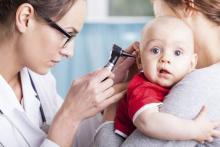PORTLAND – Samantha McVey brought her 4-month-old daughter, Ruby, to The Children’s Clinic for a routine check-up and vaccinations. But within minutes of sitting down with Dr. R.J. Gillespie, McVey was describing her turbulent childhood with a drug-addicted father who spent time in prison.
“How do you think that affects your parenting now?” Dr. Gillespie asked.
“I don’t want my kids to have to go through that,” said Ms. McVey, 23.
Ms. McVey told the doctor she considers herself a good mom but occasionally loses her temper and yells at Ruby’s 5-year-old sister, Madison. “Sometimes I get to the point where I’m crazy,” she said.
Dr. Gillespie is among a growing number of pediatricians across the country going beyond the typical well-child visit and delving deeper into the history of families like McVey’s. The goal is to prevent children from experiencing traumatic events that can interfere with their brain development and increase their risk of physical and emotional problems in adulthood.
A growing body of research shows that children who experience abuse, neglect, or other “toxic stress” have a greater likelihood of developing chronic diseases when they get older.
In response, the American Academy of Pediatrics is urging doctors to intervene by identifying and offering assistance to parents and young patients they believe to be at risk. The academy has not endorsed a specific screening tool, and doctors around the country, including in California, Massachusetts, and Maryland, are trying different approaches.
Dr. Gillespie and the doctors in his practice are trying to identify parents who have had traumatic upbringings to help prevent them from raising their children in the same way.
“Most of what we learn about being parents obviously comes from how our parents treated us,” Dr. Gillespie told Ms. McVey during her recent visit. “We’re trying to understand where parents are coming from so we can find the people who might need a little bit more help.”
Gillespie’s former partner, Dr. Teri Pettersen, has left the practice to get the message out. She now does training for the Oregon Pediatric Society on the issue of toxic stress and the role of doctors in preventing it.
“We were trained to deal with diabetes,” Dr. Pettersen recently told a crowd of doctors and other staff of the Providence Medical Group in Portland. “We were trained how to deal with hypertension. I don’t think anybody was really trained on how to address some of these adverse childhood experiences.”
Persuasive Research
Between 1995 and 1997, researchers conducted a seminal study on toxic stress, based on more than 17,000 Kaiser Permanente patients in San Diego.
It showed that adults who had more dysfunction in their homes as children were more likely to have cancer, chronic lung disease, and heart disease, as well as depression and substance abuse problems. Patients were asked questions about childhood, including whether a parent was mentally ill, imprisoned, or alcoholic and whether they suffered physical or sexual abuse.
Researchers from Kaiser Permanente and the Centers for Disease Control and Prevention found that people with four or more “adverse childhood experiences” were twice as likely as those with none to have cancer and four times as likely to have emphysema. The reasons are complex, but one explanation is that such stress leads to unhealthy lifestyle choices, such as smoking. Also, it can affect hormones like cortisol in a way that ultimately damages the body’s organs, and can alter how genes are expressed and the brain develops.
More than 50 research articles have been written based on the data from the Kaiser Permanente patients, who are still being followed. Researchers have found that later-life problems can be reduced if children are able to develop a healthy relationship with a parent or caregiver, or get certain clinical treatments. (Kaiser Health News is not affiliated with Kaiser Permanente.)
Dr. Andrew S. Garner, who is leading a work group for the American Academy of Pediatrics, said the science about toxic stress is clear. The harder part, Dr. Garner said, is figuring out how pediatricians can best use the research – especially how to have conversations about tough childhoods without alienating families. “We’re struggling to try and translate what we know into what we do in clinical practice,” he said.
That’s what Dr. Gillespie and Dr. Pettersen set out to do.
'So Nice To Get Advice’
At The Children’s Clinic, where stuffed monkeys hang from cut-out trees in the lobby and children flip through colorful storybooks, they created a survey in 2013 asking parents about their past experience with abuse, neglect, bullying, foster care, and neighborhood violence.


